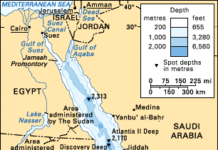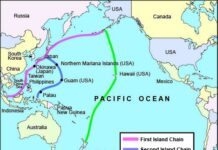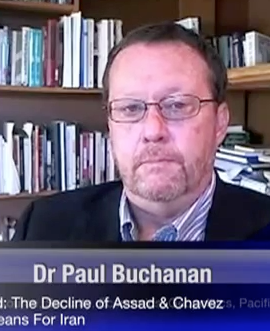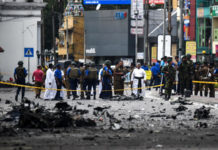Regional Affairs Architecture:
MENU:
SPREP | Regional Orgs | Treaties & Trade Pacts | SPRFMO | Pacific Islands Report | UPNG Journal | FAO Repository | Coral Reef Initiatives | Pacific Regionalism (UN) | Regionalism (ADB)
36th Parallel Assessments’ Overview: South Pacific Regional Architecture
About Secretariat of the Pacific Regional Environment Programme – Direct Link
People are the most important part of the Pacific Islands. The welfare of the people is a defining value that guides all of the work of the Pacific Regional Environment Programme (SPREP).
SPREP is a regional organisation established by the governments and administrations of the Pacific region to look after its environment. It has grown from a small programme attached to the South Pacific Commission (SPC) in the 1980s into the Pacific region’s major intergovernmental organisation charged with protecting and managing the environment and natural resources. It is based in Apia, Samoa, with over 70 staff.
Regional Organisations of the Pacific – Direct Link
FFA is affiliated with a number of regional organisations in the Pacific. This affiliation is formalised through the advisory body known as the Council of Regional Organisations in the Pacific (CROP). The following organisations are members of CROP:
- Secretariat of the Pacific Community The Secretariat of the Pacific Community (SPC) is a regional technical and development organisation. SPC work programmes develop the technical, professional, scientific, research, planning and management capability of Pacific island people. The agency has three main divisions: land, marine and social. SPC’s headquarters are located in Noumea with a sub-branch in Suva.
- Pacific Islands Forum Secretariat – As the administrative arm of the Pacific Islands Forum, the Pacific Islands Forum Secretariat (FORSEC) undertakes programmes and activities that support, or implement, decisions made by the Forum Leaders. The Forum Secretariat is also the base of CROP. The Secretariat is based in Suva, Fiji.
- South Pacific Regional Environmental Programme – The South Pacific Regional Environment Programme’s (SPREP) charter is to strengthen the capacity of Pacific island members to plan and manage their own national environmental programmes and to enchance regional cooperation to deal more effectively with issues that are transboundry in nature or which require interventions at the global level. The work of the organisation covers nature conservation, pollution pervention, climate change and economic development.
- South Pacific Applied Geoscience Commission – The South Pacific Applied Geoscience Commission (SOPAC) work focuses on providing assistance to its 20 member countries in three key programme areas: Ocean and Islands Programme, Community Lifelines Programme and Community Risk Programme.
- Pacific Islands Development Programme – The role of the Pacific Islands Development Programme (PIDP) is to provide professional services and research information to Pacific Island governments. The organisation is based at the East-West centre in Hawaii is involved in the following five major activity areas: Secretariat of the Pacific Islands Conference of Leaders, United States/Pacific Island Nations Joint Commercial Commission Secretariat, research, education and training.
- South Pacific Tourism Organisation – The South Pacific Tourism Organisation (SPTO) is the mandated to promote the Pacific Islands as a tourist destination. The SPTO’s objectives, through tourism are: strengthening regional cooperation; contributing to sustainable development; promoting global awareness of the region; enchancing the resources of the region; and promoting the cultural diversity of the region.
- University of the South Pacific – The University of the South Pacific (USP) provides tertiary education to the Pacific region. USP has 12 Member Countries and three campuses: Laucala Campus located in Suva, Fiji; Alafua Campus located in Apia, Samoa; and Emalus Campus located in Port Vila, Vanuatu. USP Centres are located in each Member Country.
Treaties & Trade Pacts
Environmental Treaties and Resource Indicators (ENTRI) – Direct Link To Text
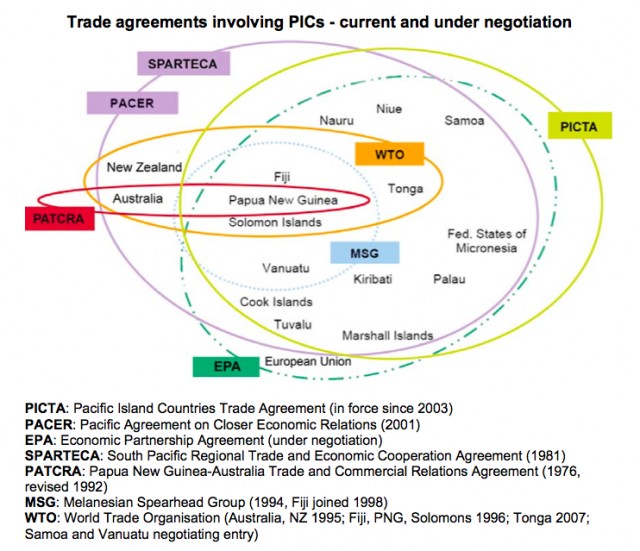
Pacific Islands Countries Trade Agreements – Graph courtesy of Oxfam NZ.
Agreement Establishing the South Pacific Regional Environment
Programme (SPREP) [as an intergovernmental organisation]
Done at Apia, 16 June 1993, Entered into force 31 August 1995.
South Pacific Regional Trade and Economic Co-Operation Agreement (SPARTECA) – Direct Link (pdf)
The Governments of Australia, the Cook Islands, Fiji, Kiribati, Nauru, New Zealand, Niue, Papua New Guinea, Solomon Islands, Tonga, Tuvalu and Western Samoa, being members of the South Pacific Forum.
Melanesian Spearhead Group (MSG) Trade Agreement (MSGTA) – Direct Link (pdf)
The Government of the Independent State of Papua New Guinea, the Government of the Solomon Islands and the Government of the Republic of Vanuatu.
South Pacific Regional Fisheries Management Organisation
Science Working Group (SWG) – Direct Link
Introduction
The purpose of the science working group is to co-ordinate the compilation of science information to support the establishment of a South Pacific RFMO.
The SWG evaluates benthic impact assessments prepared by Participants in respect of proposed bottomfishing operations in the SPRFMO Area.
The SWG conducts intersessional work on the basis of work prgrammes agreed by the international meetings. The intersessional work of the SWG is conducted via email and this website. The current workplan is included in the Report of the most recent meeting.
The SWG is chaired by Andrew Penney (New Zealand).
Participation
Participation in the science working group is open to scientists from states, entities, regional economic integrated organisations and observers participating in the international meetings on the establishment of the South Pacific RFMO.
The Psychology of Consensus in Melanesia – Direct Link (pdf)
Leo Marai – University of Papua New Guinea
Journal Of Pacific Rim Psychology – Consensus is an essential ingredient for conflict resolution, reconciliation, agreement, and peace in Melanesian societies. The psychological aspects of its positive influence in establishing a common ground between conflicting parties have not been explored. From a psycho-cultural perspective, I focus on the positive dynamism of consensus. I provide the Bougainville crisis within Papua New Guinea as a case vignette to illustrate the utility and significance of consensus in the search for concrete principles to unite a ‘disoriented’ world. In doing so, the issue of incorporating indigenous psychological knowledge into mainstream psychology becomes clearer. The article searches for psychological principles germane to reducing conflict and maintaining peace. This kind of utility is exemplified in a case study of achieving consensus in Papua New Guinea.
FAO Corporate Document Repository – Direct Link (pdf)
Summary information on the Role of International Fishery and other bodies – After the peak total catches of over 26 million t observed in the late 1980s, total landings in Area 61 declined from 25.7 million t in 1990 to 24.8 million t in 1993. The main fisheries in Area 61 are: salmon, flatfishes, cods, Alaska pollock, croakers, seabreams, Pacific sandlance, Atka mackerel, filefishes, Pacific saury, Japanese jack mackerel, scads, amberjacks, pomfrets, herrings, Japanese pilchard, anchovies, tuna and tuna-like species, hairtails, chub mackerel, sharks and rays, crabs, prawns, shrimps, oysters, mussels, scallops, cockles, Japanese carpet shell, clams and cephalopods. Landings of bony fishes not included above was 5,362,532 t in 1993.
Institut de Recherche Pour le Developpement – Direct Link (pdf)
Coral Reef Initiatives for the Pacific Initiatives Corail pour le Pacifique – Auteur : Jean-Brice Herrenschmidt
L’initiative pour la protection et la gestion des récifs coralliens dans le Pacifique, engagée par la France et ouverte à toutes les contributions, a pour but de développer pour l’avenir une vision de ces milieux uniques et des peuples qui en dépendent ; elle se propose de mettre en place des stratégies et des projets visant à préserver leur biodiversité et à développer les services économiques et environnementaux qu’ils rendent, tant au niveau local que global. Elle est conçue en outre comme un vecteur d’intégration régionale entre états développés et pays en voie de développement du Pacifique.
Pacific Regionalism – Direct Link (pdf)
Prepared by Iosefa Maiava.
Why Regionalism?
Regionalism presents opportunities for Pacific Island countries to overcome problems related to smallness and remoteness.
It also creates a bigger cooperative region in which Pacific peoples will have more opportunities for activities not viable at the national level.
The Pacific Plan the most ambitious regional innovation for far provides the most comprehensive and integrated regional framework for all stakeholders and partners to support through regionalism national efforts at improving good governance and economic opportunities.
Toward a New Pacific Regionalism – Direct Link (pdf)
An Asian Development Bank–Commonwealth Secretariat Joint Report to the Pacific Islands Forum Secretariat
This report was prepared for the Pacific Islands Forum Secretariat (PIFS) in Suva, Fiji Islands. The report is one output of an Asian Development Bank (ADB) technical assistance project.
Pacific Islands Report (Links)
Pacific Islands Development Program/East-West Center
With Support From Center for Pacific Islands Studies/University of Hawai’i
Pacific Islands News And Information Links
Newspapers | Magazines/Journals | Radio/TV News | Other News Resources | Related Organizations | Pacific Islands Governments | Other Pacific Islands Links
Newspapers
- Age (Melbourne, Australia)
- Australian, The
- Australian Financial Review
- Australian News Network
- Canberra (Australia) Times
- Cook Islands Herald
- Cook Islands News
- Courier-Mail (Brisbane, Australia)
- Fiji Times Online
- Fiji Sun
- Guam Business Magazine
- Hawai‘i Tribune-Herald (Hilo, Hawai‘i)
- Honolulu Star-Advertiser
- Honolulu Weekly
- Kaselehlie Press
- The Kiribati Independent
- Marianas Business Journal
- Marianas Variety
- Marshall Islands Journal
- Maui News (Wailuku, Hawai‘i)
- National (Papua New Guinea)
- National Indigenous Times (Australia)
- New York Times: Asia-Pacific News (Requires free registration)
- New Zealand Herald
- Nouvelles Calédoniennes (French)
- Pacific Business News
- Pacific Daily News (Guam)
- Pacific Scoop
- Port Vila (Vanuatu) Presse
- Post-Courier (Papua New Guinea)
- Press: New Zealand News
- Saipan Tribune (Northern Mariana Islands)
- Samoa News (Pago Pago, American Samoa)
- Sydney (Australia) Morning Herald
- Taimi ‘o Tonga
- Tonga Star
- Vanuatu Daily Post
- Washington Post: Asia-Pacific News (Requires free registration)
- West Hawai‘i Today (Kailua-Kona, Hawai‘i)
Magazines/Journals
- Café Pacific
- Contemporary Pacific
- Fiji Handbook: Finding Fiji
- Kabar Irian: Irian Jaya News Magazine
- Manoa: A Pacific Journal of International Writing (University of Hawai‘i)
- Micronesia: University of Guam Journal of Natural Sciences of Micronesia and Related Areas
- Micronesian Journal of the Humanities and Social Sciences
- Pacific Economic Bulletin
- Pacific Journalism Online (University of the South Pacific)
- Pacific Journalism Review
- Pacific Magazine (PacificBasin Communications)
- South Pacific Journal of Natural Science (SPJNS)
- Tahiti Handbook: Finding Tahiti
- Tahiti-Pacifique Magazine
Radio/TV News
- ABC News Online: Australian Broadcasting Corporation
- BBC News: Asia-Pacific
- Bula Fiji Radio
- CNN: Asia-Pacific
- Fiji 1 News
- Fiji Village News (FM96/Navtarang/VitiFM)
- Hawai‘i Public Radio
- Jane Resture’s, Pacific Islands Radio
- KHNL: News (Honolulu, Hawai‘i)
- KUAM: Island News (Guam)
- National Public Radio (Washington, D.C.)
- Radio Australia
- Radio New Zealand International (RNZI)
- Réseau France Outre-Mer (RFO) – French Territories Web Radio
- Solomon Islands Broadcasting Corporation (SIBC)
Other News Resources
- Agence France-Presse
- Agence Tahitienne de Presse
- Asia Pacific Media Network
- Asia-Pacific Network
- CocoNET Wireless
- Fiji Live
- Map South Pacific
- NewsRoom (Wellington, New Zealand)
- Pacific Media Centre
- Pacific Media Watch
- Pacific Population Data
- Pacific Studies WWW Monitor
- Pacific/World Weather
- Papua New Guinea: World-Wide Virtual Library, Australian National University
- Planet Tonga
- SamoaLive
- Solomon Islands People First Network
- Te Karere Ipurangi (Maori News Online)
- Wallis and Futuna: ‘Uvea Mo Futuna”
- Yokwe Online (Marshall Islands)
Pacific Islands Governments
- American Samoa
- Commonwealth of the Northern Mariana Islands (CNMI)
- Cook Islands
- Federated States of Micronesia
- Federated States of Micronesia, Investment Information and Opportunities
- Federated States of Micronesia, Legal Information System
- Federated States of Micronesia, President’s Office
- Federated States of Micronesia, Visitors Board
- Yap State Government
- Kosrae Visitor’s Bureau
- Fiji
- French Polynesia
- Guam
- Hawai‘i
- Nauru
- New Caledonia (French)
- New Zealand
- Niue
- Palau
- Papua New Guinea
- Prime Minister’s Office of Papua New Guinea
- Embassy In The United States
- Papua New Guinea Tourism Promotion Office
- Republic of the Marshall Islands
- Samoa
- Solomon Islands
- National Parliament of the Solomon Islands
- Solomon Islands Ministry of Commerce, Employment and Tourism
- Solomon Islands Embassy, Taipei
- Tonga, Government of
- Vanuatu
Related Organizations
- Secretariat of the African, Caribbean and Pacific Group of States (ACP)
- American Telemedicine Association Pacific Islands Chapter (PICATA)
- Asian Development Bank (ADB)
- Asia-Pacific Center for Security Studies
- Asia-Pacific Development Information Programme (APDIP)
- Asia-Pacific Economic Cooperation (APEC)
- Association of Southeast Asian Nations (ASEAN)
- AusAID (Australian Government’s Overseas Aid Program)
- Australian National University Pacific Studies WWW Virtual Library
- Bishop Museum
- Canada-South Pacific Ocean Development Program
- Center for Pacific Islands Studies (CPIS), University of Hawai‘i
- Center for South Pacific Studies, University of New South Wales
- Centre for Pacific Studies, University of Nijmegan, The Netherlands
- Centre for the Contemporary Pacific, Australian National University
- College of Micronesia – FSM
- Counterpart International
- Divine Word University (Papua New Guinea)
- East-West Center
- European Centre on Pacific Issues (ECSIEP)
- European Society for Oceanists
- Fiji Institute of Applied Sciences
- Fiji School Of Medicine
- Food & Agriculture Organization (FAO) of the UN — SIDS Department
- Forum Fisheries Agency (FFA)
- Foundation of the Peoples of the South Pacific
- International Monetary Fund (IMF)
- Japanese Society for Oceanic Studies
- Marshall Islands Nuclear Claims Tribunal
- Micronesia and South Pacific Program, University of Oregon
- Micronesian Area Research Center (MARC)
- Micronesian Seminar
- Northern Marianas College
- Oceania Customs Organisation
- Oceania Sport
- Pacific and Asian Affairs Council (PAAC)
- Pacific Basin Economic Council (PBEC)
- Pacific Business Center, University of Hawai‘i at Manoa
- Pacific El Niño-Southern Oscillation (ENSO) Application Center Pilot Project
- Pacific Institute Of Public Policy
- Pacific Islanders In Communications (PIC)
- Pacific Islands Development Program (PIDP)
- Pacific Islands Forum Secretariat
- Pacific Plan Online
- Pacific Islands Center (Tokyo)
- Pacific Islands Trade & Investment Commission (Sydney, Australia)
- Pacific Islands Trade & Investment Commission (Auckland, New Zealand)
- Pacific Islands Forum Trade Office (Beijing, China)
- Pacific Islands News Association (PINA)
- Pacific Islands Studies Program, Center for Asian and Pacific Studies, University of Oregon
- Pacific Islands Telecommunications Association
- Pacific Peoples Partnership (PPP, Formerly South Pacific People’s Foundation)
- Pacific PestNet
- Pacific Resources for Education and Learning (PREL)
- Pacific Telecommunications Council
- Palau International Coral Reef Center
- PEACESAT (Pan-Pacific Education and Communications Experiments by Satellite)
- Sasakawa Pacific Islands Nations Fund
- Seacology
- South Pacific Applied Geoscience Commission (SOPAC)
- Secretariat of the Pacific Community (SPC)
- Secretariat of the Pacific Regional Environment Programme (SPREP)
- Small Islands Developing States Network (SIDSnet)
- South Pacific Tourism Organization: South Pacific Islands
- United Nations Economic and Social Commission for Asia and the Pacific (ESCAP)
- l’Université Française du Pacifique — University of New Caledonia (French)
- l’Université de la Polynésie Française– University of French Polynesia (French)
- University of Hawai‘i (UH)
- University of Otago: New Zealand & Pacific Studies
- University of the South Pacific (USP)
- University of the South Pacific School of Law
- Western Pacific Regional Fishery Management Council
- West Papua Action
- World Bank
- World Health Organization: Western Pacific Region
- World Wildlife Fund South Pacific Programme Office
Other Pacific Islands Links
- Abara Banaba
- Aloha2Go Radio
- Albatross Project
- Alternative Hawaii – Calendar of Special Events in Hawaii
- Banaba (Ocean Islands) 1960
- Bikini Atoll
- CIA World Factbook Country/Territory Profiles
- American Samoa (USA)
- Cook Islands
- Coral Sea Islands (Australia)
- Federated States of Micronesia
- Fiji
- French Polynesia (France)
- Guam (USA)
- Kiribati
- Marshall Islands
- Nauru
- New Caledonia (France)
- New Zealand
- Niue
- Norfolk Island (Australia)
- Northern Marianas
- Pacific Ocean
- Palau
- Papua New Guinea
- Pitcairn Islands (UK)
- Samoa
- Solomon Islands
- Tokelau (NZ)
- Tonga
- Tuvalu
- Vanuatu
- United States Pacific Island Wildlife Refuges (Baker Island, Howland Island, Jarvis Island, Johnston Atoll, Kingman Reef, Midway Islands, Palmyra Atoll)
- Wake Island (USA)
- Wallis and Futuna (France)
- Commonwealth of the Northern Mariana Islands
- Cook Islands Bulletin Board
- Crazy-Man Documentaries
- Digitised Pacific Resources: Global Collections
- Easter Island (Internet Directory)
- Easter Island Statue Project
- Easter Island Tourism
- Festival of Pacific Arts
- Fijigirmit
- Fiji Women’s Crisis Centre
- Finding Easter Island
- Inside Maluku
- Irian Jaya (West Papua)
- Island Climate Update: South Pacific Islands
- Island Law
- Jane’s Oceania Home Page
- Joint Typhoon Warning Center
- Kavabowl – The Pacific Forum
- KiaOrana.com
- Kwajalein, Republic of the Marshall Islands
- My Micronesia.com
- National Weather Service Forecast Office, Guam
- Niue: Rock of Polynesia
- Norfolk Island
- Northwestern Hawaiian Islands Coral Reef Ecosystem Reserve
- Oceanic Art Society (OAS)
- Pacific Arts Association
- Pacific Arts Online: arTok
- Pacific Development Directory
- Pacific Health Dialog (PHD)
- Pacific Information and Communications Technology (ICT)
- Pacific Concerns Resource Centre (PCRC)
- Pacific Legal Network
- Papua Web
- Peace Movement Aotearoa
- Pitcairn Island
- Pitcairn Islands Study Center
- Polynesian Cafe
- Polynesian Cultural Center
- Polynesian Voyaging Society
- Rapa Nui (Easter Island)
- Rapa Nui: The Navel of the World
- Regional Assistance Mission Solomon Islands (RAMSI)
- Rongelap Atoll Ecotourism
- Rongorongo
- Samoan Sensation
- Samoa, the Heart of Polynesia
- SamoaWeb (The Sooalo/Mao SamoaWeb Site)
- Small Islands Voice
- South Pacific Organizer
- Tuvalu Online
- Tuvalu.tv
- United States of America Embassy: Suva, Fiji Islands
- Vanuatu Online
- Wallis and Futuna: Uuvea Mo Futuna Discussion Group
- Wallis and Futuna
- West Papua, International Action for (IAWP)
- West Papua Information Kit
- Wouter’s Pacific Islands Trip



